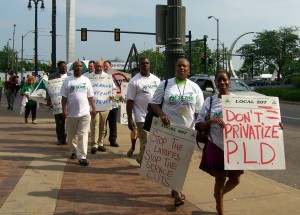 Four-year, $150 million contract approved 6-2 by members who got paid by DTE
Four-year, $150 million contract approved 6-2 by members who got paid by DTE - Councilwoman Watson says Charter requires a vote of the people
- Residents, workers firmly oppose deal
- DTE meanwhile to get $253 million rate increase
By Diane Bukowski
(This story updates and combines information from earlier Voice of Detroit posts.)
DETROIT, Nov. 3— The City Council today approved a $150 million four-year contract with DTE Energy to buy 100 percent of power previously generated by the Public Lighting Department (PLD) from the private utility.
PLD powers and maintains the city’s street lights and traffic signals, over 890 public buildings, and Detroit’s city’s public safety communications network, including 911 and its automated dispatch system, according to its website.
The vote essentially came down to who got paid. Only Council members JoAnn Watson and Brenda Jones voted “no.”
DTE-RELATED PAYMENTS TO CITY COUNCIL MEMBERS, 2009
CHARLES PUGH: Hiram Jackson, PLD contractor, $500; Bertram Marks, DTE attorney $1000; Kirk Lewis, Bing Group $2,000 (Bing on DTE Board 20 yrs)
GARY BROWN: DTE ENERGY PAC $3400; Bertram Marks $750; Hiram Jackson $500
SAUNTEEL JENKINS: DTE ENERGY PAC $2000; Joyce Hayes-Giles, DTE top exec. $500; Covanta, DTE supplier $1,000; Hiram Jackson $500
Ken Cockrel, Jr.: DTE ENERGY PAC $4,000;
Brenda Jones: DTE ENERGY PAC: $4,000; James Tate: Covanta Energy $1,000; Andrew Spivey: Hiram Jackson $500
(These do not include numerous large contributions from the Detroit Regional Chamber, Detroit Renaissance and other entities DTE belongs to.)
Mayor Dave Bing, who sat on DTE’s board for 20 years and has several DTE employees working on loan to the city, introduced the contract. DTE’s CEO Anthony Earley chaired Bing’s inaugural earlier this year.
Both were members of a “business leadership group” set up by U.S. District Judge John Feikens in 2008 that paved the way for privatization and regionalization of the city’s largest asset, the Detroit Water and Sewerage Department.
“The City Charter says the city cannot close or sell a public utility without a vote of the people,” Watson stormed prior to the vote. “Buried in the language of this contract is a provision that it ‘eliminates the necessity for Mistersky Power Plant to produce electric power.’ We can be sued for this.”
Watson said the $17 million a year that Al Fields, Bing’s utilities group executive, said the city expects to realize through the deal “pales in comparison” to revenue the city could generate from providing public power to its residents at lower rates than those charged by DTE .
The contract also gives DTE the right to increase its cost “way beyond $150 million,” and to store its own equipment at the city’s Mistersky Power Plant, with the city liable for security of the equipment, according to Watson.
The contract is 100 percent city-funded.
“The rates will consist of a capacity charge, energy charge, initial period credit, and wholesale distribution charge which will change each year based upon rate adjustments issued by the Michigan Public Service and Federal Energy Regulatory Commissions” according to the PLD proposal.
To add insult to injury, the Council voted knowing that DTE Energy filed for a $253 million rate increase with the Michigan Public Service Commission (MPSC). According to a new state law, the increase will take efect PENDING MPSC approval.
DTE announced third-quarter earnings this year of $163 million or 96 cents per share, an increase over last year’s third quarter, when the utility earned $151 million or 92 cents per share
The council voted directly in the face of Keyana Jackson, who lost her Moenart Street home, belongings and pets in the Sept. 7 inferno caused by DTE’s negligence of its electric wires, particularly its failure to trim trees in that east-side neighborhood.
Jackson was barely able to speak during public comment due to her depression.
“I’m homeless, I have three disabilities, three children and I am only 30 years old,” Jackson told the council. “I don’t know how I ever got to this situation.”
Edith Payne, whose own home burned down in 2007 due to DTE’s failure to trim trees, testified that such fires happen all the time.
“In the last four months, over 1,000 power lines have gone down, sparking and arcing,” she said.
Other Detroit residents and workers testified against the deal, both Nov. 1 and in earlier hearings.
They said DTE has caused the deaths of dozens of children, seniors, and laid-off workers through power shut-offs. Due to DTE’s lobbying in the state legislature, it is now a felony for residents to obtain power necessary for their families’ life and health through so-called “illegal” hook-ups when they cannot afford to pay DTE’s exorbitant rates.
“I find it appalling,” Carl Williams said. “We have a plant that used to sell power, and now we are going to pay DTE $150 million instead. We should take that money and invest it in Mistersky, and sell our own power to our citizens, instead of dealing with the DTE monopoly, which is in collusion with Dave Bing.”
Watson also campaigned to make Detroit a “public power” city as was intended by former Mayor Hazen Pingree when the Public Lighting Commission was first established in 1893.
“Sixteen cities in Michigan including our state capitol of Lansing have public power and light, and their residents pay 30 percent less than cities that have investor-owned utilities like DTE and Consumers Power,“ Watson said. “Why can’t we obtain federal stimulus funds for green energy to rehabilitate Mistersky to do the same?”**
When former Mayor Dennis Archer proposed buying the city’s power from DTE in 2001, then City President Maryann Mahaffey asked, “Why can’t we purchase power directly from the grid like Cleveland Power and Light, and the city of Wyandotte, rather than paying an additional charge to go through Edison?”
Andre DuPerry, Detroit’s Chief Procurement Officer and a Bing appointee, claimed that the city applied twice for stimulus funds to renovate Mistersky, but was denied.
City Council Fiscal Analyst Irvin Corley told the council the city would have to tie into the national grid at a cost of $10 million to effectuate Watson’s proposal, but retired city electrician Keith Hines said Detroit is already tied into the grid.
“There is a deliberate attempt to deceive here,” Hines said. “The council is not educated in energy technology. PLD IS attached to the national grid. We can rebuild our plant because there is millions and millions of green money in Washington just sitting there waiting for us.”
City administrators also contended that PLD was founded only in recent decades to power institutions, and has lost its customer base due to the flight of the auto industry (ed.–which was never powered by PLD).
However, PLD’s website says it was founded in 1893 as the Public Lighting Commission. In the wake of the 1891 rebellion of Detroit’s workers and residents known as the “Trolley Riot,” progressive Mayor Hazen Pingree had the city lay power lines to residences as well as businesses, intending for Detroit to provide public power in addition to establishing public transportation. In a special report in the early 2000’s, the city’s former auditor general Joseph Harris recommended rehabilitating those lines to establish a public cable company, as has been done in other cities, to charge lower rates and to bring revenue into the City.
The website says that Mistersky had a capacity of 184,000 kilowatts by 1979, and a customer base of over 890 public buildings including city departments, the public schools, Wayne County Community College, Joe Louis Arena, Cobo, and other federal, state and county agencies.
In recent years, PLD has shut down four of its seven generators to buy power from DTE instead, eventually purchasing 80 percent of its power from the private utility at inflated charges. As a result, dozens of power plant operators, engineers and other workers were laid off under the Archer and Kwame Kilpatrick administrations.
For many Blacks and women in these skilled trades jobs, the city was the only source of work for them, because the private sector historically discriminates against them.
PLD has now put its remaining street and traffic lighting maintenance workers out of their jobs as well, according to AFSCME Local 207 President John Riehl,
“The city needs to invest in public utilities and infrastructure like PLD,” Riehl said. “They claim it is cheaper to privatize, but the prices they are citing for PLD production [57 cents as opposed to 27 cents from DTE] are inflated because they are factoring in legacy cost pension obligations and the city’s bond debt.”
Laid-off street lighting maintenance worker James Anderson told the council, “There is no one that can do my job as efficiently or as cheaply. If the department were run efficiently, we would be working. Private maintenance workers get $11 an hour more than we do, and waste money by replacing fixtures instead of repairing them.”
Anderson said he worked for the city for 21 years, during which three bond proposals were passed by Detroiters to upgrade Mistersky. Watson demanded to know what had happened to that funding. Fields said $40 million in bonds had been spent to date to upgrade Mistersky, but Corley said the city has not been able to market additional funds due to its downgraded bond ratings.
AFSCME Local 207 has filed suit in Wayne County Circuit Court, seeking an injunction against the sub-contracting of its bargaining unit work, particularly in the Detroit Water and Sewerage and Public Lighting Departments. The suit says the city’s actions violate the anti-privatization clauses of the City Charter, which include notice to the union at various stages of intent to subcontract, an opportunity for union workers to bid on the work, and a two-thirds vote of the city council.
Wayne County Circuit Court Judge Gershwin Drain earlier issued an order barring the city from further violations of these clauses.
“In clear violation of the Charter, the Ordinances and the order of Judge Drain, the city administration has continued to request and the City Council has continued to approve contracts that replace City employees with private contractors without any attempt to comply with the anti-privatization provisions of the City Charter or of City Ordinances,” says the lawsuit.
It is awaiting a hearing in front of Wayne County Circuit Court Judge Wendy Baxter.
Dempsey Addison, president of the Association of Professional and Technical Employees (APTE), spoke on behalf of the Coalition of Organized Labor (COOL), which includes most city unions.
“We are 100 percent opposed to the privatization of PLD,” she said. “Through one of my members, we know that the city can collect $55 million in public utility taxes, but has not been doing this, because it will not hire the necessary staff.”
Ade Oba Abdalla, of the Energy Efficiency and Environmental Health Services Task Force, called on the council to postpone its vote until a complete copy of the DTE contract has been made availabe to Detroiters. He said that when he asked Brown and other council members for a copy, he was told he would have to file a Freedom of Information Act request. However, any document provided to the City Council is publicly available through the City Clerk’s office.
 **The 16 cities referenced by Watson belong to the Michigan Public Power Agency [MPPA], “a non-profit, customer owned, joint action power supply agency established in 1978 under Michigan Public Act 448,” according to its website. “The Agency provides economic benefits to its 16 municipal members and is involved in joint ownership of electrical generating plants and transmission facilities. The 16 cities are Bay City, Charlevoix, Eaton Rapids, Grand Haven, Harbor Springs, Hart, Holland, Lansing, Lowell, Petoskey, Portland, St. Louis, Traverse City, Wyandotte, and Zeeland.
**The 16 cities referenced by Watson belong to the Michigan Public Power Agency [MPPA], “a non-profit, customer owned, joint action power supply agency established in 1978 under Michigan Public Act 448,” according to its website. “The Agency provides economic benefits to its 16 municipal members and is involved in joint ownership of electrical generating plants and transmission facilities. The 16 cities are Bay City, Charlevoix, Eaton Rapids, Grand Haven, Harbor Springs, Hart, Holland, Lansing, Lowell, Petoskey, Portland, St. Louis, Traverse City, Wyandotte, and Zeeland.

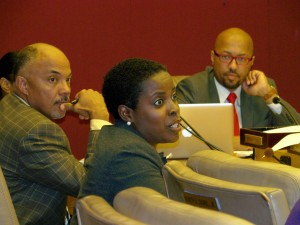
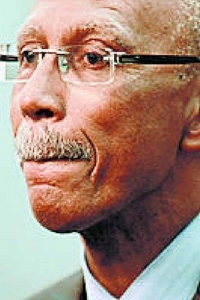
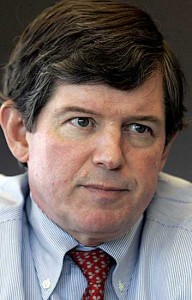
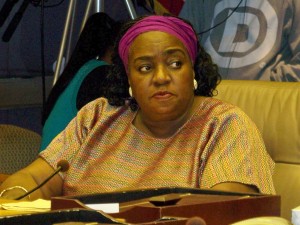




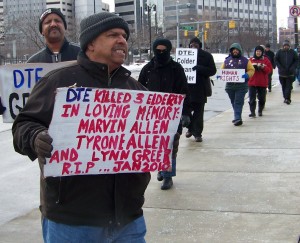


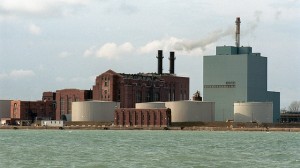
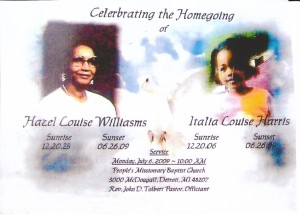
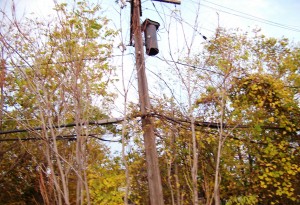




Wow, incredible weblog structure! How lengthy have you ever been blogging for? you make blogging glance easy. The full look of your web site is excellent, let alone the content material!
Don’t give Watson a Pass. She is also paid. Her role is to spew rhetoric to make you think you have a voice; thereby legitimizing that bankrupt council in your eyes. Watson is just as corrupt as all the rest of them. Kinyatta saw it coming. And like he did on the school board, that “brave African warrior” suddenly took ill, and ran for his political life. He’ll show up after the dust has cleared.